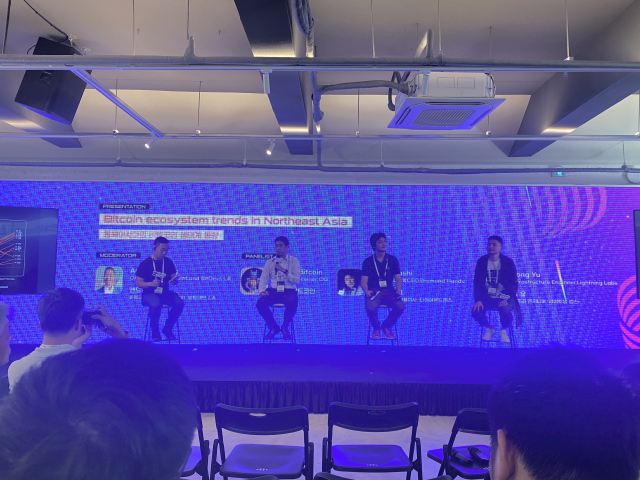
Domestic and foreign virtual asset experts have called with one voice for the need to improve awareness of Bitcoin (BTC). It is argued that there is a need to change the perception of government authorities and the general public so that BTC can be used not only as a simple investment asset but also as a means of real-life payment or store of value by utilizing its original value.
At 'Bitcoin Seoul 2024' held at Peaches Garden in Seongsu-dong, Seoul on the 31st, Bitcoin Core developer Jimmy Song said, "If we understand the value of Bitcoin as a good store of value and utilize it well, we can help Asian and Korean societies to take care of the lost future." “We can regain hope,” he emphasized. Jimmy Song, a Korean-American Bitcoin Core developer, points out fiat currency as the source of problems in modern society through books such as 'Fiat Money Ruining Everything' and advocates 'Bitcoin Standard', which replaces fiat currency with BTC. He is a representative Bitcoin advocate. He argued, “Vested interests are controlling people by devaluing the currency by easily raising and lowering interest rates in an unprecedented way,” and “Bitcoin is what can give hope to people who are becoming increasingly poor.”
Related articles
- Traveling to 42 countries for 800 days with only Bitcoin “The whole world is one with Bitcoin” [Bitcoin Seoul 2024]
- “Up to 100,000 CBDC pilot transactions… Will bring about innovation in financial infrastructure” [Bitcoin Seoul 2024]
- “Bitcoin compensation when providing data to AI companies… Can also be issued as NFT” [Bitcoin Seoul 2024]
- “Mass adoption of Bitcoin through spot ETF… It will be an interesting year in conjunction with the US presidential election” [Bitcoin Seoul 2024]
Other experts who participated in the panel discussion that day also agreed on the need for education to help the general public understand the utility of BTC. In particular, it was emphasized that BTC can be a means of hedging inflation in Southeast Asian regions such as Indonesia, Thailand, and Vietnam, which are experiencing problems caused by the existing fiat currency system, such as falling currency value and low financial accessibility.
Dea Rezkisa, Southeast Asia regional master at Pedi, a virtual asset service company, said, “Even though traditional currencies in Southeast Asia are extremely vulnerable, with Indonesia’s inflation rate reaching 5-7%, there is still a strong perception that virtual assets are gambling.” “We hold about 20 meetups every month in the city, conveying the fact that BTC is a very good store of value medium,” he said. Albert Boo, founder of Neutron Pay, also said, “In Southeast Asia, there are many people who do not have accounts or cannot get a credit card due to credit issues due to low accessibility to banking services. “If you use BTC as a payment method, the worries about this can disappear,” he said.
The industry is also actively working to improve the perception of governments around the world that view BTC as a threat to their own currencies. Piriya Sambandaraksa, Chairman of Light Shift, said, “In Thailand, industries in each field are communicating with the government. “I feel that the level of understanding of BTC has risen to the level of a financial investment tool,” he said. “As the people are gradually accepting BTC, I think the government will eventually follow the people’s decision.”
Virtual asset experts from the three Northeast Asian countries agreed that the government's excessive regulations on virtual assets are hindering industrial development. Atomic Bitcoin, a Korean Bitcoin influencer, said, “The biggest problem in the Korean virtual asset market is regulation,” and added, “To establish a corporation and do Bitcoin-related business in Korea, you must obtain a virtual asset business operator (VASP) license. “It is very difficult,” he pointed out, adding, “The problem is that withdrawal of BTC has become very difficult due to travel rules, making it difficult to withdraw BTC and experience actual use.”
Koji Higashi, co-founder of Diamond Hands in Japan, also said, “In Japan, after the Coincheck hack in 2018, regulators have become very strict on virtual assets,” adding, “The BTC payment market has not been activated because exchange licenses are required for custody wallets.” “This is an example,” he said. China, which is known to have the most stringent regulations on virtual assets among the three countries, as virtual asset issuance (ICO), mining, and trading are all banned, also said that it expects the government to take a forward-looking attitude toward virtual assets. Yong Yu Lightning Labs An infrastructure engineer said, “Although virtual asset-related businesses and even exchange operations are illegal, it is possible to hold BTC and engage in peer-to-peer trading (P2P),” adding, “However, the recent approval of Hong Kong’s virtual asset spot exchange-traded fund (ETF) is a sign of some change.” “I hope that spot ETFs will be allowed in mainland China as well,” he said.


- Reporter Kim Jeong-woo
- woo@decenter.kr
< Copyright ⓒ Decenter, unauthorized reproduction and redistribution prohibited >








